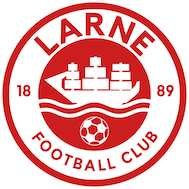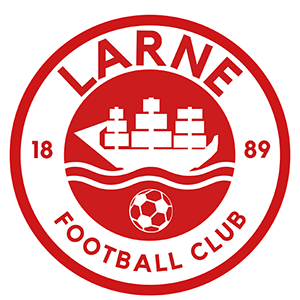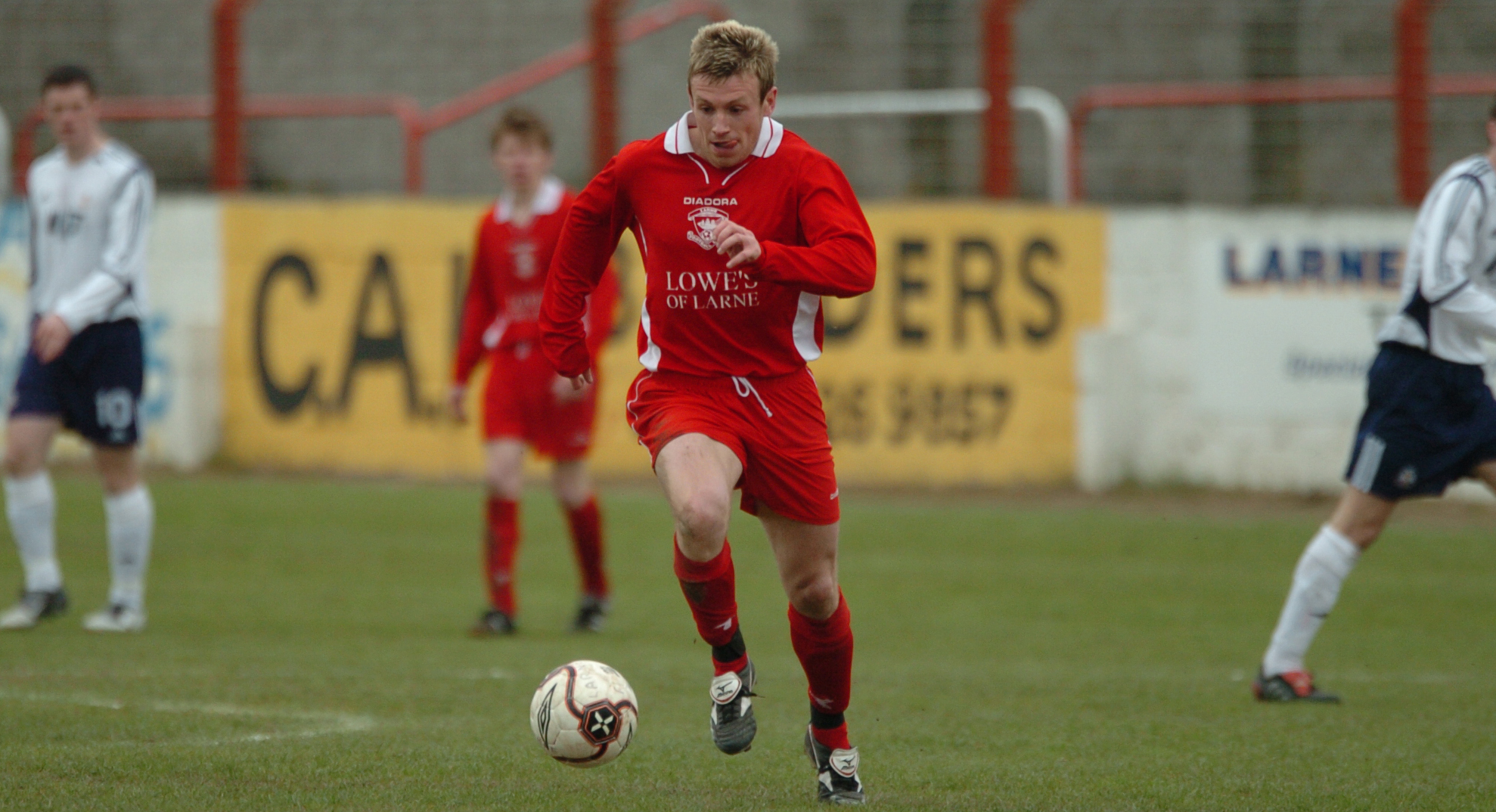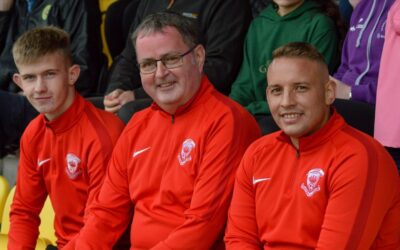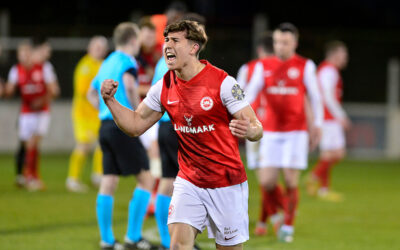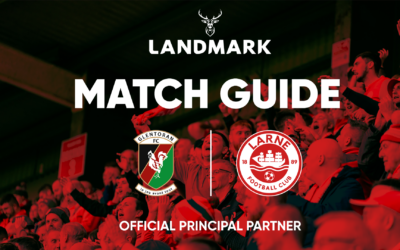Journey is one of those buzzwords everyone in football seems to throw around these days, however for some it really is justified – just ask Julian Ward.
The Aintree-born midfielder plied his trade at Inver Park, 15 years ago, during Larne’s last stint in the Premiership. Ward arrived in Northern Ireland to further his education and career, enjoying a successful stint under Kenny Shiels and Jim Hagan in the process.
However, his time at Inver Park is just one rung on the ladder of his football career which has taken him to a World Cup and paved the way for spells on the staff of two of the biggest clubs in the English Premier League.
Ward is currently in his eighth year of employment at Liverpool, where he works as loan pathways and football partnerships manager. It means he now oversees the loan moves for some of the game’s most promising prospects.
Rewind to 2005 however, as it was Ward himself who was looking to make his way in the game. He takes up the story: “I had been playing at Morecombe, but before I came to Northern Ireland I was on the semi-pro scene with the likes of Southport and Hyde United.
“I was 24 when I decided to do a PHD at Jordanstown, so I moved over to come to the University of Ulster. The course began in September 2005 and by chance, I knew Conor Lynch from the University, who was at Larne at the time.
“I ended up training with Larne and Kenny Shiels, who was the manager at the time, came to watch in a game for UUJ. I scored two goals that day, so that maybe convinced Kenny he was getting a goalscoring midfielder!
“Because I had moved over in the September time I couldn’t sign for Larne outside the window. Kenny got me to the Welders until Christmas and that was good, because I could play some games for them for the first few months and get adapted to the game here.
“Once January came Kenny got me in the team and thankfully I was able to stay in it.”
Ward arrived at the club just as the situation was stabilising under the wily management of former-Ballymena manager Shiels. The team were progressing and steadily climbing away from relegation trouble in the 2005/06 season.
The form in the second half of that season was underlined with an Irish Cup run to the semi-finals, losing to Glentoran. As Ward explains, this had its disadvantages for members of the squad who were also studying together.
“It helped coming to Larne because I already knew some of the guys from the Uni,” Ward added.
“Kris Lindsay was studying at Jordanstown at the time and playing for Larne, Conor Lynch as I say, Johnny Montgomery and Niall Curneen was there too. A good few of us were also playing for UUJ in the Collingwood Cup that year, which we managed to win.
“I don’t think Kenny was too pleased though, because we had games during the week and then an Irish Cup quarter-final on the Saturday. In the end, it meant six games in six days – I think you’d describe players as being in red zone nowadays!”
While Ward arrived at a club who, at that point, were perennially battling to keep afloat in the top flight, he found some quality players around him in the squad. The front two picked themselves in the former of Stranraer-based Gary McCutcheon who was partnered by Mark Dickson, someone who would go on to win everything there is in the Irish League. At the back, meanwhile, was Northern Ireland under-21 International, and current Dungannon Swifts boss, Kris Lindsay. As Ward points out that trio helped to give confidence to players around them.
“I think with those two strikers up front and Kris at the back it gave us a great structure,” he said.
“Kenny was also a manager who had everyone well organised. With Gary and Mark up front, we always felt that if we stayed in a game then we could rely on one of those two to take a chance at the other end.
“The team were fighting off relegation for a good part of that season and normally when that’s the case you end up trying to flood the midfield or pack the defence, but we knew we had to get those two in the team together. Sometimes that meant coming up against an extra man in midfield, but you didn’t mind because you knew they were so important for us.
“Kenny Shiels was also a good manager to play under. His coaching was very good, he was very enthusiastic and organised. I think you saw that when he went on to coach in Scotland with great success. It was a real disappointment when he had to leave at the end of that season because of his job with the IFA.”
Following Shiels’ departure in the summer of 2006, then assistant manager Jim Hagan was handed the reins. Jim was always likely to be up against it having to replace three of his key men, in the shape of Lindsay, McCutcheon and Dickson.
“We lost a few key players in that summer, as well as Kenny himself,” Ward reflected.
“Gary went to Portadown, and Mark and Kris went to Linfield and that was a big part of the spine of the team.
“I liked Jim and I enjoyed playing under him. He placed trust in young players and always wanted to give them a chance, but it was always going to be difficult to replace players that we lost.
“I remember we started off ok in the League Cup that season but struggled in the league. Looking back, it was probably always going to be an uphill struggle with the quality of player who left in that summer.”
Following Jim Hagan’s departure in November 2006, Ward was preparing to play under his third Larne manager in less than a year. With Paul Curran’s arrival, game time would prove to be limited for the English midfielder and that eventually led to a move to Lisburn Distillery.
“I really bought into being at the club, and some of my best experiences in football have come from playing in the Irish League,” he said.
“Paul came in and I started to get used wide in midfield. I wanted to contribute although I probably didn’t feel that was my best position. In the end, I didn’t get the game time I had under Kenny and Jim and had to look for a new challenge.
“I had a call from Paul Kirk at Distillery and ended up going there and enjoyed it as well. I can’t speak highly enough of my time in Irish League.”
Halfway through his time at Ballyskeagh came the opportunity of a lifetime for Ward. Previous work he had done came to the attention of Portugal Carlos Queiroz and before he knew it, Ward was preparing for a World Cup qualifying campaign which would take him all the way to South Africa.
“I still had time left on my contract at Distillery, but then an opportunity came up which I couldn’t really turn down,” he said.
“Carlos Queiroz had just left Manchester United to take over as Portugal’s head coach. I had done some part-time work for someone that Carlos knew at United. He told me Carlos was looking to build a scouting team with Portugal. I went for an interview and he gave me the opportunity to go to Lisbon and work with him.
“It was the build-up to the 2010 World Cup and part of the role was having a handle on upcoming opponents. Most of Portuguese talent pool also play outside of Portugal and so my role was also to organise scouts to stay on top of players for the national squad too.
“That involved players playing in the likes of England, Spain, France and Germany. There were probably 15 or 16 places in the squad which were nailed on each time, but that left eight or nine spots up for grabs that we would monitor.
“In the end, Portugal got through a difficult World Cup group, but lost to Spain in the last 16, who eventually went on to win the competition. The Federation ended the contracts of Carlos and staff after the World Cup and it was time to move on.”
Following the unique experience of preparing for a World Cup, the next part of Ward’s professional journey brought him to work at the Etihad Stadium, just as things were really beginning to take off for club with huge investment.
“I wanted to stay in game, and City were looking at expanding their recruitment and staff department,” he said.
“I had got some experience of players in different parts of the world at this stage, with the likes of latin Europe and South America. I spent two seasons at the Etihad, including when the Premier League was won for the first time in 2012, and that was really enjoyable.”
From the Etihad, it was on to Anfield where he would eventually take up a key role in the structure of one of the biggest clubs in Europe.
“I’m in my eighth season at Liverpool now, and for the last three or four years I have moved into the role of loan pathways and football partnerships manager,” he said.
“Essentially, I work with the Sporting Director, the manager and the Academy Director. I help to oversee players who are on loan with other clubs, helping their development, getting them a broad experience and ultimately trying to ensure they are ready to come back to Melwood to make a positive impression.
“It’s about trying to bridge the gap between under-23’s football and the first team.”
Ward’s now day-to-day environment of Melwood – Liverpool’s impressive training complex – may seem a world away from his days in the Irish League. However, as he explains, it’s not long before a connection with this side of the Irish Sea pops up.
“It’s a small world, because I played with Ryan McCann at Distillery,” he began.
“Last season his brother Grant was the manager of Doncaster. Rovers. He made a phone call to ask about taking a player, Herbie Kane, on loan. When you’re making contacts like that it’s based on trust, and how they will handle a player. It helped to have that connection with Ryan, so it made it just more than a phone call between two people who didn’t know each other.
“Herbie went on loan with Grant at Doncaster, they ended up having a good season. Grant got the Hull City job and now Herbie has gone there on loan for the rest of the season.”
However, it’s not just the Championship and League One clubs where Liverpool’s young prospects head for temporarily, as Ward explains.
“We have a player at Kidderminster at the minute and it shows that young players don’t always hit the ground running straight into the first team,” he said.
“For a lot of players it’s about going on a journey and making that progression. Personally, I find it helps my dealings with a young player that I went on a journey of my own. Moving away from home, coming to Northern Ireland and then working with Portugal and in other places. I try to hammer home to a lot of these young lads just how fortunate they are to be in this environment.
“I think you also see the advantage of being schooled in the likes of the Irish League and how it can prepare you for the rigours of football time football. You look at Stuart Dallas who had time in the Irish League when he was younger. He went to Brentford, he’s now at Leeds and a key international player and may be playing in the Premier League next season.
“At Liverpool, I think Andy Robertson would tell you he is stronger today for his journey he has been on at lower levels in Scotland.”
If there’s anyone well qualified to talk about the journey you can find yourself on in football, it’s Julian Ward.
